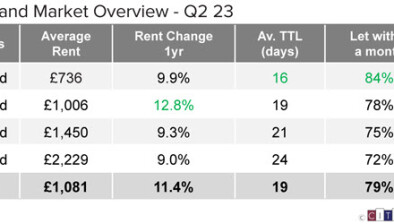Landlord refused permission to appeal against tribunal decision into alternative accommodation costs

The Upper Tribunal for Scotland has refused permission for a landlord to appeal against a decision to award him just £710 in a claim for cleaning costs and related expenses against a former tenant he valued at over £2,200.
Appellant Norman Blair had sought the payment from tenant Nitin Jangda, who occupied his Edinburgh property from January 2021 to early June 2021 as one of five co-tenants. He argued that the First-tier Tribunal had erred in finding that he was not entitled to recoup the cost of alternative accommodation for a new tenant while the room occupied by the respondent was being cleaned and repainted.
The appeal was heard by Sheriff Donald Corke of the Upper Tribunal for Scotland (Housing and Property Division).
Vacant possession
The appellant was the landlord of a 5-bedroom property at Calder Road, Edinburgh, which he let out mainly to students with five tenants in occupation at any one time. Under the terms of the lease, a tenant who wished to leave the property before the other tenants could do so if the landlord accommodated their request and would do so without forfeiting rent if they left at the end of August. The respondent ceased to occupy the property on 10 June 2021.
A dispute arose between the parties as to whether and when the respondent had agreed to leave, but also the state in which he had left his room. On 14 June 2021, the replacement tenant told the appellant that he had not moved into the room as it was “disgustingly filthy” and believed that the respondent had been smoking in the room. A claim was made to the FtT for a total of £2202.62, encompassing the cost of cleaning and painting the room as well as the cost of alternative accommodation for the new tenant.
It was decided by the FtT that the appellant was entitled only to a payment order of £710 due to the respondent’s failure to keep the property clean. The Tribunal took the view that the appellant had taken a risk in coming to an agreement with a new tenant at a time when he could not guarantee vacant possession of the room and it was reasonably foreseeable that when one tenant left there may be work that required doing before a new tenant could move in. The landlord had made the agreement at his own risk and any obligations in terms of that agreement could not fall onto the respondent.
The appellant argued that the FtT had erred in ruling that the respondent, in his correspondence to the appellant, had not indicated a move out date upon which the landlord was entitled to rely. Additionally, the Tribunal had erred in ruling that the tenant was not required to pay an agreed fee to enable him to be relieved of his individual obligations under the tenancy.
At odds with legislation
In his decision, Sheriff Corke began: “The FtT has carefully considered and set out not only their initial decision but also the reasons for the refusal to grant permission to appeal to the UTS. I agree with their approach and conclusions. The FtT made certain findings in fact and law, including [that] ‘although there was an agreement that the Respondent could leave before August without penalty there was no agreement on an actual date when the Respondent would leave’.”
He continued: “There is no reason to consider that they missed any material out of consideration. The appellant strongly disagrees with their conclusions, but that does not mean that they were not entitled to make them on their interpretation of the evidence. I agree that there is no arguable point of law with reference to the categories set out in Advocate General for Scotland v Murray Group Holdings Ltd (2015).”
Noting that the Tribunal had also refused to allow an “agreed fee” of £340 based on the tenant leaving before the tenancy’s suggested “end date”, the sheriff said: “It is plain from the decision and the reasons for refusal of permission that the FtT refused to allow the agreed fee because they accepted the evidence of the respondent on this point. They considered that this sum of £340 was not lawfully due, as [they] took the view that this term was therefore entirely at odds with the legislation which allows tenants and joint tenants to give notice to leave in specific ways at any time during a tenancy without penalty.”
He further quoted with approval from the FtT’s decision: “Whilst the Tribunal accepts that a joint tenancy may be capable of being ended in this way, by agreement of all and a new tenancy can be created with continuing tenants and the ‘new’ tenant, this does not in our view allow a landlord to impose terms which do not accord with the legislation.”
Sheriff Corke concluded: “The appellant has his own and strongly held views on the legitimacy and utility of the £340 payment. However, and for the reasons given by the FtT there is no arguable point of law.”
Permission to appeal was therefore refused.








